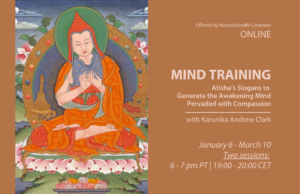My mom has trouble remembering. It’s a disease, progressing. She can ask or say the same thing seven or eight times in a brief conversation. This makes me sad sometimes, and the future impact of this disease may bring more grief. For now, I hang out mostly in acceptance—and gratitude for all that makes my mother’s predicament workable, both emotionally and materially.
Conversations with my mom make me feel like a movie actor with multiple opportunities to play the same scene. I try to be patient and kind and relaxed in these exchanges, but I sometimes fall short. I feel exasperated with her repetitions and let it show. Or I’m disappointed with her resistance today to a suggestion she embraced yesterday, and I raise my voice. The process of memory loss (and the process of witnessing it) can seem cruel. There is, though, surprising mercy in the opportunity for a retake. In my dealings with others, I’m trying to be someone who’s not quite me—a version that’s unselfish, utterly unbiased, generous, and free. It often feels like I’m playing against type. Would the people who know me best cast me in this role?
What a help, then, that I can redo some scenes. Was there a little edge in my voice when my mother asked (again) if I’d eaten? I let go of shame and guilt, and I set my intention anew: next time when she asks, I’m going to relax before I answer. My tone of voice will reflect my awareness of her wish to feed me, to care for me, as she did tirelessly when I was little. This time, I’ll play the scene as a daughter who appreciates her mother’s care and can patiently answer. Or maybe I’ll be the daughter who doesn’t even need to develop patience, who is present to the freshness of each exchange.
Exercise/Meditation/Ejercicio
When you know you’ll be spending time with someone who might rile you, bore you, disappoint you, or exhaust you, consider this approach:
- The way you typically react, the way you usually interact, in such scenes is Take 1.
- Imagine you’re working with a director who’s really into improvisation. Consider your next encounter as Take 2. Could there be another way to play this scene? (”Play” not in the sense of being fake, but in the sense of being open, curious, creative.)
- For Take 2, can you try on a new attitude, embody a new feeling, speak new words? Can you be a kid trying on a parent’s clothing, both playful and heartfelt?
- The adjustments made by actors are often quite subtle and internal. Maybe all you’ll do differently is pause for a second or two before responding. Maybe you’ll open your hands or arms as you speak. Maybe you’ll think to yourself, I love this person!
- A subtle change may get you a shade closer to who you aspire to be. And there’s always Take 3. Action!

A student of Dzogchen Ponlop Rinpoche since 2015, clinical psychologist Ellen Balzé began working with the core Path of Mindful Activity team in 2018. Collaborating with other Nalandabodhi members on various projects has created precious opportunities for her to pause, relax, and reflect. She enjoys baking bread and caring for succulents.






